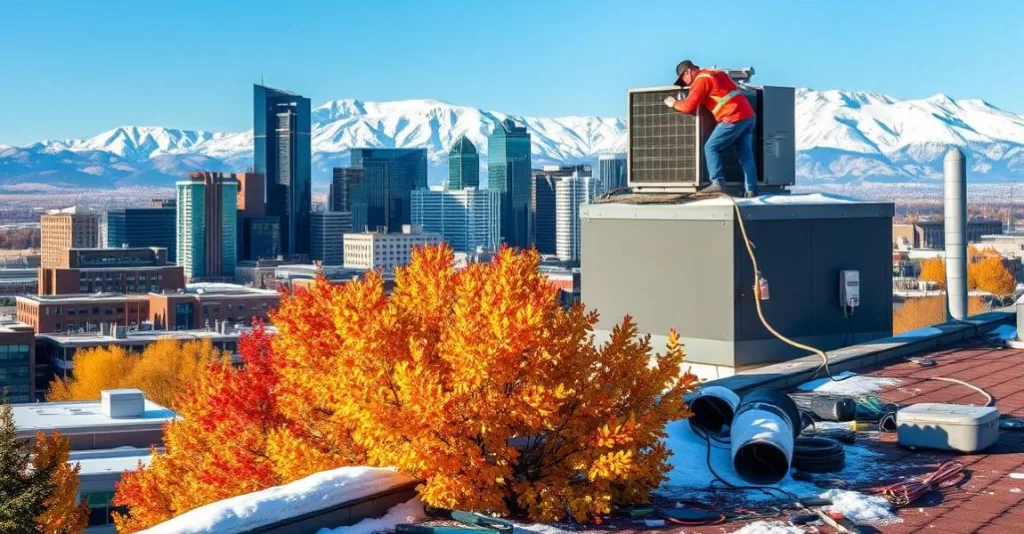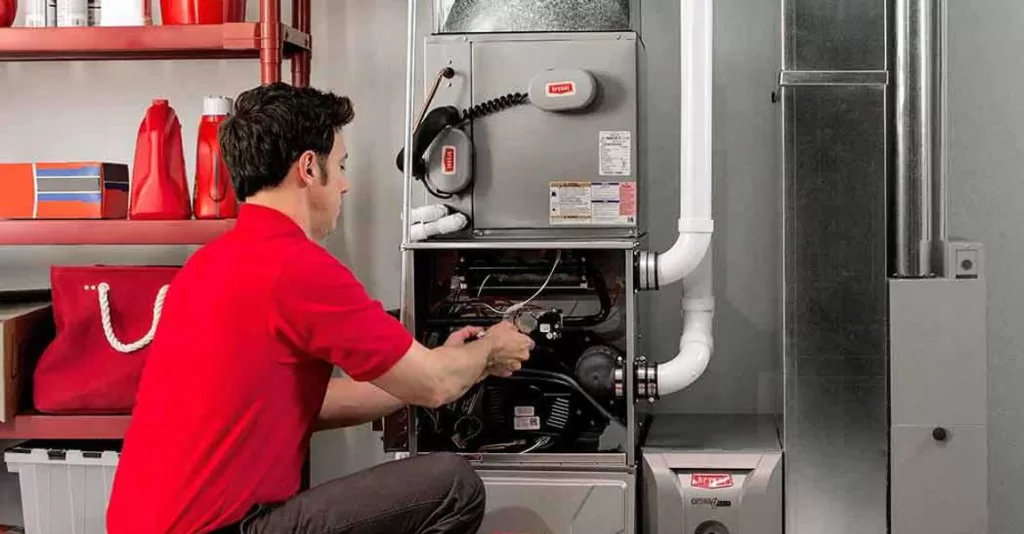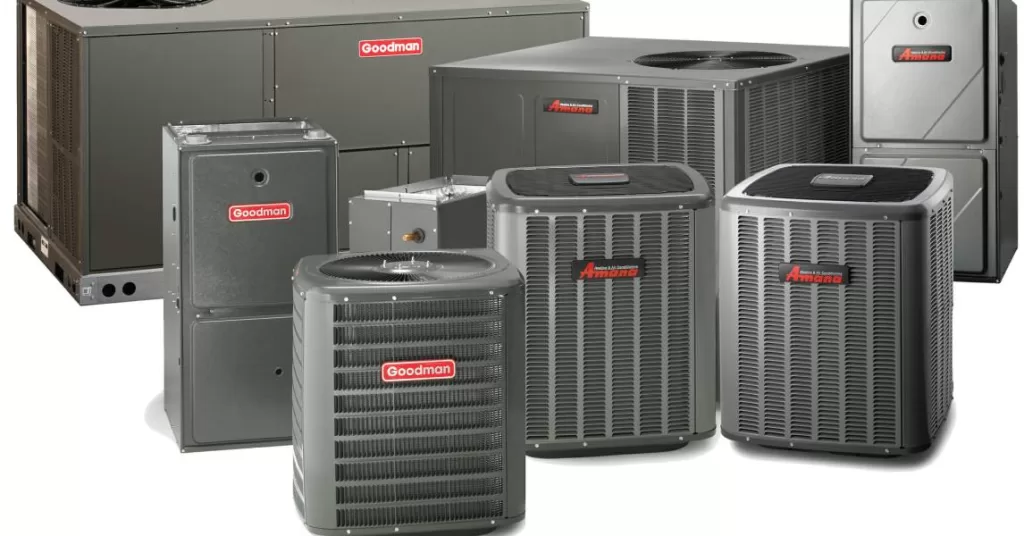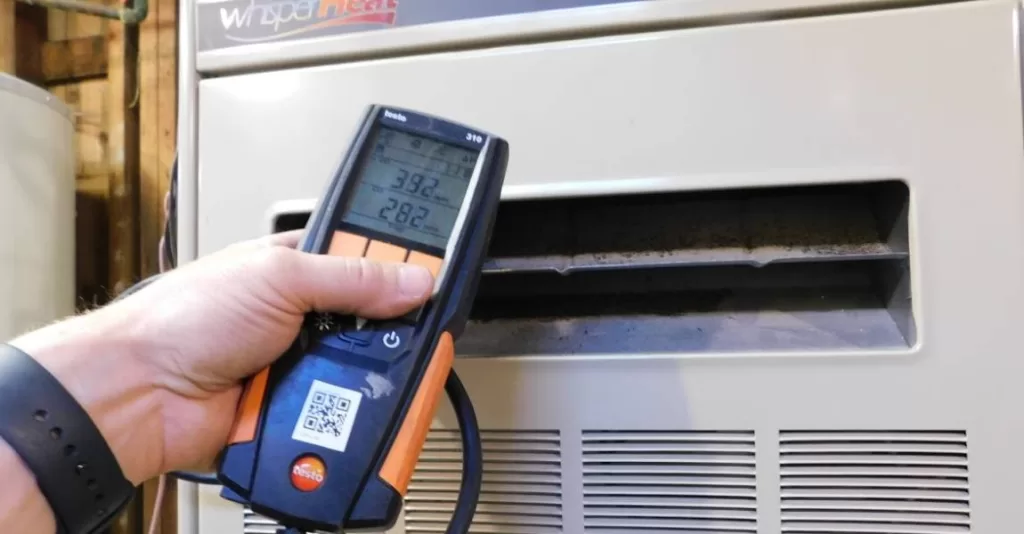Ever thought about what it costs to stay warm in Denver? With its beautiful snowy views, a broken furnace in winter is unwelcome. Furnace maintenance is key for comfort and safety at home. Being proactive with your heating system prevents cold discomfort and future high costs. This guide provides Denver homeowners essential Denver furnace repair tips and HVAC system care. It helps avoid furnace issues and keeps your living space warm, efficient, and safe.
Ready to take charge of your home heating? A well-maintained furnace is essential for a comfortable and economical home. Learn to troubleshoot furnace problems confidently and know when to call for expert Denver furnace repair. This guide is more than troubleshooting; it’s a complete path to furnace maintenance mastery. It can save money and keep you warm during the cold months.

Key Takeaways- Furnace Repair Guide
- Understand the significance of a 33-point inspection for ensuring comprehensive furnace maintenance.
- Gain from years of industry experience with specialized Denver furnace services available seven days a week.
- Learn about the importance of regularly changing furnace filters to maintain system efficiency.
- Learn about the preventative measures to avert future heating system issues.
- Explore the detailed checklist covering crucial components for furnace and boiler Maintenance.
- Maximize benefits with the Home Care Club, including exclusive offers like a 2-year warranty and repair discounts.
- Consider the advantages of furnace replacement in Denver if your unit is over 15 years old or beyond repair.
Table of Contents
Diving Into DIY Furnace Repair
Investing in DIY furnace repair and preventive maintenance is a wise choice. It boosts your home’s HVAC system and avoids expensive issues later. Knowing the basics helps your gas furnace work well, keeping your home cozy when cold.
Begin by regularly checking your furnace system. Do annual look-overs and change air filters every month, mainly when you use it a lot. These steps are crucial to do it yourself furnace upkeep.
Knowing what your furnace needs is more important than just checking and changing filters. Below, discover tips and maintenance schedules to keep your HVAC great.
- Monthly replacement during high winter usage to ensure optimal airflow and furnace efficiency.
- Annual furnace inspections to keep in line with warranty requirements and to preempt any foreseeable issues.
- Regular combustion chamber cleaning to maintain the furnace’s health and efficiency.
| Maintenance Task | Frequency | Benefits |
|---|---|---|
| Change air filter | Every 1-3 months | Improves air quality and furnace efficiency |
| Professional furnace cleaning | Annually | Extends furnace lifespan and identifies potential hazards |
| Check and replace carbon monoxide detector batteries | Every 6 months | Ensures safety from potential gas leaks and malfunctions |
While taking on DIY furnace repair tasks is good, some problems need a pro. HVAC technicians can tackle the extensive repairs, ensuring your gas furnace is safe and in tip-top shape.
Identifying Common Furnace Problems in Denver Homes
As winter comes, it’s crucial to check your furnace. Solving common issues keeps your home cozy and improves the furnace’s life and efficiency. We will look at the frequent problems that Denver homeowners face. This guide can help you fix some problems yourself before you need a professional.
Read more here if your Furnace Not Blowing Hot Air?
Recognizing Signs of Corrosion
One early warning of furnace trouble is signs of corrosion. Metal parts like heat exchangers and burners can suffer. Moisture from heating and cooling cycles causes this. Checking these components monthly helps avoid breaks and increases safety and effectiveness.
Dealing With Leaky Pipes and Drain Lines
Leaky pipes and drain lines can cause big problems. They lead to airflow problems and water damage, which might result in mold. Sealing leaky ducts with metal tape helps, but serious leaks might need pros. Experts from Fix-it 24/7 can handle these issues.
The Perils of Dirt and Debris: Keeping Air Filters Clean
A dirty air filter leads to common furnace problems. It blocks airflow, stressing your furnace and worsening air quality. Cleaning or changing your air-filter every three months, or more in dusty seasons, boosts efficiency and cuts costs.
Keeping an eye on your furnace and fixing minor problems helps avoid extensive repairs later. JD’s Plumbing, Heating and Air Conditioning provides top-notch furnace services. They’re fast and experienced, ensuring your furnace works well during Denver’s cold months.
Common Furnace Problem Checklist
- Pilot Light
- Check the Circuit Breaker
- Gas Leak and Gas Supply
- Gas Valve
- Dirty or Clogged Air Filter
- Airflow
- Vent and Ductwork
- Check The Thermostat
- Check The Area Around The Furnace
- Check Heating Element
DIY Furnace Troubleshooting: When to Seek Professional Help
It’s key to know about diy furnace troubleshooting as winter comes to keep your home warm and safe. However, some issues need more than a DIY solution, prompting a call to a furnace repair technician.
A common furnace problem is a rattling noise, which may mean misalignment or loose parts. Often, this noise results from dirt buildup or loose parts. While you might fix some issues by tightening screws or cleaning deep problems in the furnace, call for a professional HVAC technician’s help.
Checking for carbon monoxide (CO) leaks is a critical safety step in furnace maintenance. Mercaptan, added to natural gas, helps signal gas leaks with its unique smell. Sadly, over 400 Americans die each year from accidental CO poisoning, underscoring the need for expert checks. A professional HVAC technician can check and fix these deadly risks.
If your furnace frequently needs burner resets because of pilot light issues, get help from an HVAC professional. Regular service from a certified tech not only keeps you safe but also keeps the warranty valid. DIY fixes might void this warranty.
While tackling diy furnace troubleshooting, know when to stop. Tasks like electrical work require professional skills and meeting safety rules. The U.S. Environmental Protection Agency and HVAC pros suggest changing air filters every three months for better air and furnace performance.
If your furnace still has issues, or if its safety is doubtful, call a certified furnace repair technician. Remember, a maintained furnace runs well and keeps your home safe.
The True Cost of Furnace Repair
Knowing how much you’ll spend on furnace repair costs is vital when caring for your heater. In places like Denver, with its severe cold, keeping your furnace working well is essential. It’s not just about comfort—it’s about safety, too. Visit this site for regular maintenance info.
Trying to fix things yourself might look like it saves money, but you often need an HVAC contractor for detailed checks. These pros make sure every part of your furnace works right. This can stop expensive emergency furnace repairs later on.
| Part | Repair Cost | Replacement Cost |
|---|---|---|
| Blower Motor | $150 – $450 | $850 – $2,000 |
| Heat Exchanger | $100 – $200 | $1,000 – $1,500 |
| Circuit Board | $75 – $200 | $550 – $600 |
| Draft Inducer Motor | $200 – $500 | $850 – $1,500 |
| Ignitor | N/A | $150 – $250 |
Don’t forget how important routine maintenance is. Yearly cleanings cost from $100 to $300, based on your furnace and setup. A clean furnace is more efficient and safer for you.
Sometimes, you can’t avoid emergency furnace repairs. These sudden fixes can cost $300 to $1,200. Regular check-ups help find problems early, saving money.
Furnace repair costs might feel high at first. But, ongoing maintenance can lower your chances of big bills. Always ask certified HVAC contractors for quotes. They give you peace of mind and can save you money over time.

Furnace Repair: Common Issues and Solutions
Many homeowners deal with frequent common furnace repairs. Problems like short cycling and uneven flames impact their comfort and safety. It’s crucial to recognize these issues. Knowing when to seek a furnace inspection saves time and money. It keeps your home cozy during the chilly seasons.
Addressing Short Cycling and Uneven Flames
A common heating system problem is short cycling. In this case, the furnace switches on and off too often, increasing energy bills and causing extra wear on the furnace. Usually, a filthy air filter or a faulty thermostat causes this issue. They limit airflow or fail to detect the correct temperature.
Uneven flames could signal dirty burners or serious heat exchanger problems. Regular check-ups and clean-ups often solve this. However, if uneven flames keep happening, you must contact a professional.
Confronting Strange Noises and Potential Illness
Strange noises like banging or grinding from your furnace need immediate attention. These sounds could mean several issues, such as loose panels or a failing blower motor. These noises usually warn of more significant future problems.
Sometimes, frequent headaches or flu-like symptoms aren’t just a virus. They could indicate carbon monoxide leaks, particularly from an old or unmaintained furnace. Ensuring CO detectors work well and having regular furnace checks is crucial. This could save lives.
By paying attention early to furnace problems and hiring certified experts for furnace inspections and repairs, your furnace will work well and safely, keeping your home both warm and healthy.
Blower Motor
Maintaining your furnace’s blower and blower motor is essential for consistent home heating. The blower motor powers the fan that circulates air throughout your ductwork and into your living spaces, making it a critical component of your furnace’s efficiency and effectiveness. Over time, these motors can wear out or malfunction due to dust accumulation, aging, or mechanical failure, leading to inadequate heating or complete system breakdowns.
Regular cleaning and maintenance of the blower motor and its components, including checking for signs of wear on belts and electrical connections, can prevent unexpected failures.
Evaluating Your Furnace’s Lifespan: Repair or Replace?
Making your home cozy in winter means having a good furnace. Deciding between fixing or getting a new one is big. Consider how well your furnace works and what you spend on it. This will help you choose.
Understanding Furnace Efficiency and Heating System Inconsistencies
A furnace works better if it’s more efficient. New models are usually better at turning gas into warm air. They keep your house at the same temperature. Plus, they can save you money on your energy bills. If your old furnace isn’t doing well, maybe it’s time for something new. A newer, more efficient furnace means less money spent on energy and steadier warmth at home.

The High Price of Ignoring a Cracked Heat Exchanger
A cracked heat exchanger in your furnace is serious. It’s not safe, which means your furnace might be too old. Sometimes, putting in a new furnace is cheaper than fixing big problems. The costs of fixing and added maintenance can add up. This makes getting a new system smarter.
If fixing your furnace almost costs as much as buying a new one, go for the new one. It’s smarter money-wise, and you’ll get a more efficient, reliable, and safe furnace.
Ultimately, think about how long your furnace should last and its efficiency. Keep it well-maintained to make it last. But if you see major problems like a cracked heat exchanger or uneven heating, getting a new furnace might be the right move. Choosing a new furnace can save you money over time. It keeps your home more comfortable and lowers your bills.
Furnace Filters: Change Intervals and Tips
For clean and efficient heating in your home, you need to change the furnace filter often. The schedule depends on the filter’s material and size.
For instance, 1″ to 2″ air filters should be changed every 1-3 months. Bigger 4″ filters last longer, up to 6-9 months. 5″ filters should be replaced every 9-12 months. Brands like Aprilaire recommend a 6 to 12-month change, depending on how much you use it and the environment.
Certain brands, like Amana, Air Bear and Honeywell, have filters lasting 6 months to a year. When it’s cold and you use the heater more, filters might need quicker replacements. This ensures your heater works well and the air stays clean.
Changing your air filter does more than keep the air clean. It also makes your furnace work better. Doing this regularly saves you money on energy and helps your HVAC system last longer.
If pets live in your home, you’ll need to change filters more often because of fur and dander. High HVAC use also means changing filters more often. Experts like JD’s Plumbing, Heating, and Cooling can advise on the best filter and when to change it for great heating.
| Filter Type | Change Frequency | Conditions Impacting Change Frequency |
|---|---|---|
| 1” Filters | 1-3 months | Standard home use |
| 2” Filters | 1-3 months | Standard home use |
| 4” Filters | 6-9 months | Less frequent home heating use |
| 5” Filters | 9-12 months | Minimal heating use |
| Aprilaire | 6-12 months | Variable based on model and use |
| Air Bear | 6-9 months | Depends on model specifics |
| Honeywell | 30 days to up to a year | Fiberglass (monthly) and Pleated (annually or as needed) |
Maximizing Efficiency: How to Enhance Your Furnace’s Performance
Enhancing your home’s furnace performance and energy efficiency goes beyond saving money. It also improves comfort and extends your heating system’s life. This article will cover using smart thermostats, insulation upgrades, and routine fall maintenance tune-. These steps help your furnace run more efficiently.
Smart Thermostats and Insulation Upgrades
Installing a smart thermostat can make your furnace more efficient. These devices adjust your home’s heating to match your schedule. This can lower your energy use and costs. For example, lowering your thermostat by one degree for eight hours can save about 1% on heating every year.
Insulation upgrades are also key. By insulating your ductwork, you prevent energy loss and distribute heat better. Using a smart thermostat together with insulation lets your furnace work less hard. This combo boosts energy efficiency.
The Impact of Routine Maintenance on Energy Bills
Keeping your furnace running well means doing routine maintenance. Changing the filter every 90 days increases efficiency. Minor fixes, done early, prevent more significant problems. This keeps your energy bills low and lengthens your furnace’s life.
Preventative maintenance includes replacing filters and cleaning ducts. This ensures good airflow and less strain on your furnace. It keeps your system running smoothly, avoiding costly and urgent repairs.
Remember that up to 20% of heat can escape through duct leaks to keep your furnace at its best. Sealing these leaks and cleaning your furnace yearly maintains efficiency.
| Maintenance Activity | Expected Benefit |
|---|---|
| Smart thermostat installation | Optimizes energy use, reducing bills |
| Insulation of ductwork | Prevents heat loss, enhances furnace efficiency |
| Regular filter changes | Improves airflow, maintains system efficiency |
| Annual furnace check-ups | Prevents major malfunctions, extends furnace lifespan |
By following these tips, you enhance your furnace’s performance. You also make your home more energy-efficient and comfortable. This leads to saving money as well.
Furnace Repair: Why It’s More Than Just a Service Call
Seeking a furnace repair service is an investment in your home’s comfort. This service not only fixes immediate problems. It also helps keep your heating and cooling system running smoothly. Each visit can stop future issues, keeping your home cozy in the winter.
It’s wise to know what affects service call charges. Here’s a simple guide:
- Hourly vs. Fixed Rates: Some technicians charge by the hour, while others offer a set price. Knowing this helps you plan your budget.
- Warranty Coverage: If under warranty, you might save on parts. Always double-check what your warranty covers.
- Accessibility and Condition: Hard-to-reach or poorly maintained furnaces may cost more.
- Age of Furnace and Parts: Old systems need more care, and their parts can be pricier or more challenging to find.
An HVAC technician does more than fix your furnace. They check the health of your whole heating and cooling system. This thorough inspection can spot problems early. That way, it won’t break the bank, keeping your system working well.
Regular maintenance saves you money and keeps your furnace going longer. It also makes sure it runs efficiently, lowering your heating bills. Think of each service visit as crucial for your home’s warmth and safety.
Choosing proactive care from a skilled HVAC technician saves you more than just costs. You also increase the efficiency and lifespan of your heating and cooling system.
The Furnace Repair Industry in Denver: Understanding Service Variations
Keeping homes warm and safe in Denver demands understanding the furnace repair industry. The region’s climate swings from cold winters to milder days. Knowing the range of services, from Denver HVAC service offerings to repair costs, is crucial for homeowners.
Comparing Costs: From Minor Tweaks to Major Fixes
Costs for fixing furnaces in Denver can vary a lot. It depends on the problem’s complexity and the needed services. Minor fixes might be cheap, but extensive repairs, like a new heat exchanger, can cost a lot. Learning about these costs helps you plan your budget and avoid unexpected expenses.
Navigating Warranties and Service Charge Policies
Knowing about furnace warranties and service charge policies is essential. They impact your experience with furnace repairs. Many companies in Denver offer warranties that might cover parts, labor, or both. This can save you money and give you peace of mind. Some charge a flat rate for services, while others bill based on time. Always ask about these policies to ensure they fit your budget and needs.
By understanding these costs, furnace warranties, and service charge policies, you may be able to make smart choices. These choices keep your home cozy without straining your wallet.
Furnace Repair: Essential Safety Measures and Compliance
To ensure your furnace runs well and safely, it’s vital to stay updated on furnace safety measures and risks like carbon monoxide hazards. For all Denver homeowners, knowing and following Denver contractor standards and HVAC regulations boosts your system’s performance and safety.

Preventing Carbon Monoxide Hazards and Ensuring Secure Operation
Carbon monoxide (CO) is a silent killer, hard to notice until it’s too late. Protect yourself by installing CO detectors near bedrooms and testing them every month. Check exhaust vents for damage or clogs each year to prevent CO buildup. If you ever suspect a CO leak, call a pro right away. Regularly scheduled maintenance is critical to avoiding carbon monoxide risks.
Adhering to Denver’s HVAC Regulations and Contractor Standards
Following local HVAC rules is essential for safe and legal furnace use. In Denver, furnace professionals must follow certain guidelines, including meeting state efficiency and safety standards. Always check if your technician is licensed and meets Denver’s strict standards. This confirms your furnace system’s safety and compliance with local HVAC laws.
Furnace Manual
Your furnace’s manual is crucial to its proper use and upkeep. Learn its instructions on using, maintaining, and troubleshooting your equipment. Always consult your furnace manual to adhere to the recommended safety measures. It’s handy for solving simple issues without making mistakes.
Following these safety tips, Denver’s standards, and using your furnace manual helps keep your furnace efficient and safe. These practices extend its life and ensure your home remains safe.
Conclusion
Exploring Denver furnace maintenance shows the importance of a healthy heating and cooling system, especially with the tough Colorado winters. Furnaces last about 15 to 20 years and play a key role in home comfort. When they reach 10 to 15 years, checking their efficiency is crucial. You must decide between fixing them or getting a new one. Regular maintenance extends their life and keeps them working well.
New furnace models are much more energy-efficient. This can save you money on heating bills over time. In some states, new air conditioners need at least a SEER rating 14 for better energy use. Replacing an old SEER 9 air conditioner could save more than 35% on energy costs. A skilled HVAC technician’s advice is valuable. They consider many factors, including AFUE ratings, government offers, and your situation. This could be your environmental impact or future moving plans.
It might seem more straightforward to use your system until it fails, but being proactive is smarter. Consulting with HVAC pros helps you avoid unexpected failures. Whether you do it yourself or hire a pro, your efforts keep your home warm, safe, and energy-efficient. As your system gets older, follow these tips. Think about talking to an HVAC technician to see what’s best. This way, you choose to fit your home and budget well. Contact us today!
FAQ
How Often Should I Perform Preventive Maintenance On My Furnace?
You should do preventive maintenance on your furnace yearly, best before the heating season. Check filters and seals more often to keep them working well.
What Common Problems Should I Look For In My Home?
Look for corrosion, leaks, and dirty air filters in your Denver furnace. Also, watch out for poor airflow and strange noises that need professional help.
How Can I Troubleshoot My Furnace Before Calling A Professional?
Start by checking the thermostat and circuit breaker. Replace dirty air filters and make sure vents are unblocked. Call a pro if these steps don’t fix the issue.
What Factors Affect The Cost Of Furnace Repairs?
The repair cost depends on the problem’s complexity, part prices, emergency services, and the contractor’s rates. Your furnace’s age and condition also play a part.
How Do I Decide Whether To Repair Or Replace Furnace?
Consider replacing your furnace if it’s over 15 years old or repairs cost more than half of a new one. Also, a new one might be better if you have frequent problems and high energy bills. A pro can help decide.
When Should I Change Filters?
Change your furnace filter every one to three months. This can change based on filter quality, air quality at home, and how much you use the furnace. Check it monthly, especially when using it often, and replace it as needed.
How Can I Increase The Efficiency Of My Heating System?
To make your Denver furnace more efficient, install programmable thermostats and improve home insulation. Fix duct leaks and follow a regular maintenance schedule. These steps will help it work better and use less energy.
What Should Be Included In A Furnace Service Call In Denver?
A service call should check and clean all furnace parts, test efficiency, and adjust as needed. It might also fix specific problems you have with your furnace.
How Do Warranties And Service Trip Charge Policies Affect Furnace Repairs?
Warranties might pay for parts and sometimes labor, lowering your costs. Know the service charge policies of contractors. Some remove these fees if they fix it in one visit, and others include them in your final bill.
What Safety Measures Should I Take When Fixing My Furnace?
Turn off the power, check for gas leaks or carbon monoxide, and follow local HVAC rules. Always refer to the furnace manual and hire a pro for complex repairs to keep everything safe.


